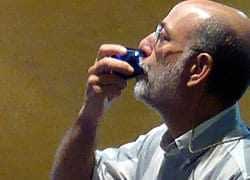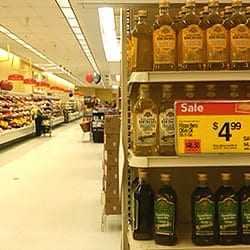A few weeks ago four large olive oil producers in Spain wrote a letter to the Spanish government attempting to discredit the sensory methodology for olive oil evaluation. They feel it is too subjective and should be discontinued as part of the standard. Perhaps it is that producers of lower grade oil just want to label it as a higher grade oil (something that it really is not) and reap the benefit of selling it at a higher price. So when it gets identified for what it really is, the classification process itself comes into question.
 If the producers do not trust the accuracy of the taste panel process, claiming it is too subjective, then test it. This could easily be done by subjecting an established (official IOC) taste panel to a scientific test in public with all of the supporters and critics present. Invite the media and several independent observers to see the evidence for themselves. In other words, set up an experiment where several oils are evaluated by a panel and record the results. Duplicate oils can be given to see if the tasters can score the oils the same each time. The panel must be able to provide statistically valid results or else the critics of the system are correct — it really is too subjective. But if the panel can rate the oils accurately and on a consistent basis, then it is not subjective.
If the producers do not trust the accuracy of the taste panel process, claiming it is too subjective, then test it. This could easily be done by subjecting an established (official IOC) taste panel to a scientific test in public with all of the supporters and critics present. Invite the media and several independent observers to see the evidence for themselves. In other words, set up an experiment where several oils are evaluated by a panel and record the results. Duplicate oils can be given to see if the tasters can score the oils the same each time. The panel must be able to provide statistically valid results or else the critics of the system are correct — it really is too subjective. But if the panel can rate the oils accurately and on a consistent basis, then it is not subjective.
 I do not believe there is a criticism of the laboratory analysis portion of the market grade evaluation process, only the sensory part. Perhaps this is because the laboratory standards are set so low almost any oil passes. For example, the standard for free fatty acid for extra virgin grade is 0.8% when we can easily make oils below 0.3%. It is also due to the fact thatlaboratory instruments can be calibrated and tested for accuracy and consistency. This is done by sending the laboratories blind samples and comparing the results to a known standard. Recognized laboratories have their equipment and processes tested on a regular basis to make sure that their results are accurate (come within the statistically accepted variability).
I do not believe there is a criticism of the laboratory analysis portion of the market grade evaluation process, only the sensory part. Perhaps this is because the laboratory standards are set so low almost any oil passes. For example, the standard for free fatty acid for extra virgin grade is 0.8% when we can easily make oils below 0.3%. It is also due to the fact thatlaboratory instruments can be calibrated and tested for accuracy and consistency. This is done by sending the laboratories blind samples and comparing the results to a known standard. Recognized laboratories have their equipment and processes tested on a regular basis to make sure that their results are accurate (come within the statistically accepted variability).
Most people do not know, however, that taste panels also are tested regularly for accuracy and consistency. The panels are sent blind samples and they must accurately rate the oils by market grade and identify the degree (numerical value) of each important attribute both positive (fruitiness) and negative (identifying the most prominent defect). These taste panels meet on a regular basis to train and maintain their accuracy. Again, they are not perfect, but must be accurate within the established statistical guidelines.
In order to be called extra virgin an oil only has to be free of defects and have some fruitiness. If this standard is too high, then lobby to change the standard. In my opinion, if this is done it will only further erode the significance of the term extra virgin. Worldwide producers of high quality fresh oil are beginning to call it “super premium”, or “beyond extra virgin”. In Australia they have even proposed to raise the standard.
Different grades of olive oil certainly exist. In my opinion, producers of fresh oil from high quality fruit should be the only ones rewarded with a higher price and the designation of extra virgin, for several reasons:
- Some defects such as rancidity are known to be harmful to human health — others such as muddy sediment are potentially harmful.
- Fraudulent mixes of extra virgin oil with refined oils, or solvent extracted pomace oils, or solvent extracted seed oils (peanut, soy, sunflower, corn,
canola, etc.) are also potentially harmful to people because of the solvent residues or to those who have allergies to these oils. If these oils are labeled as extra virgin olive oil, the consumer is being cheated in paying more for lower valued products. - Anybody can make lower grade oils. Its easy. Just harvest the fruit from the ground, do not hurry in getting it to the mill, let it sit in a pile or in bags and ferment and rot, press it with mats, run it through dirty equipment at a high temperature, or store it in dirty tanks. This is still being done and unfortunately more often than the industry would like to have the public know. Some of these easy to make oils are greatly appreciated by consumers, because they have become used to them over several generations and know no better. This is not a problem, just charge a lower price, after all they cost less to produce and certainly don’t label them as extra virgin.
- Nobody can win the race to the bottom. The current predicament we are in is because most producers and certainly the greatest portion of the world’s volume is competing to be the lowest cost product. It becomes tempting to add a percentage of seed oil or refined oil at one-fourth the cost to at least make some profit — and most consumers can’t taste the difference anyway. The end result is a sea of cheap, low quality oil that everyone wants to claim is extra virgin. Much of it is being sold below its cost of production and can only exist due to a subsidy. This unfortunately lowers the overall image of olive oil as something more expensive than other oils, but not really worth it.
- Fresh, high quality, olive oil with no defects should be recognized for what it really is — as a very healthy product and a flavor enhancer for food.
- What is the alternative? Just let every producer put on the label whatever they want and let the consumer choose in the free market? Isn’t that how we got into our current financial crisis?
- Sensory science and the use of a trained taste panel has been and is being used today extensively in the food industry for most food products (coffee, beer, cheese, wine, chocolate, fresh produce, etc.). The results of these taste panel evaluations has been very effective in helping improve the quality of products being evaluated (see the California Agriculture Journal article on the UC Cooperative Extension Taste Panel).








